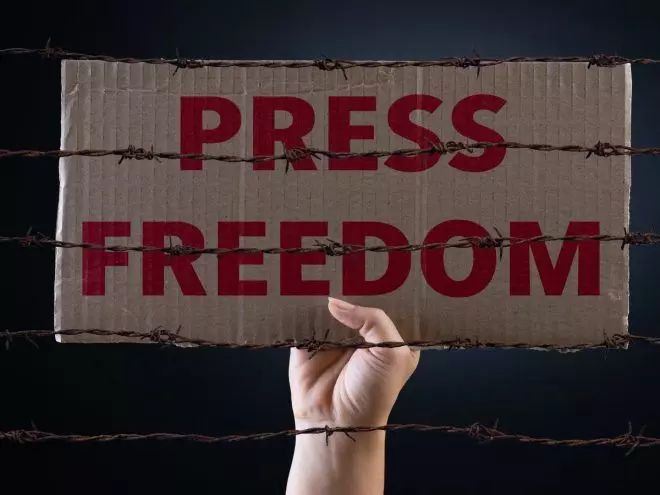
From media hunting to crony journalism
text_fieldsIndia's ranking in the 2023 World Press Freedom Index marking another slipping down may not come as a surprise to anyone. According to the index prepared by Reporters Without Borders (RSF), a global media watchdog, our position has slipped to 161 out of the 180 countries. Beyond the plummet, its scale and speed has raised major concerns. In 2022, India slipped eight places down from the previous year while this year, we dropped 11 places down from last year. Media freedom in the world's largest democracy has declined sharply over the past decade. India ranked at 140th position in 2014 and today the country has slumped by 21 positions. What makes the fall this time more alarming is that we are behind Taliban-ruled Afghanistan and army-controlled Pakistan. Only 19 countries including North Korea, China and Vietnam fare lower than India in press freedom. The stock response of the Indian government is that the findings by RSF were fundamentally flawed and that its methodology was questionable and non-transparent, and that was why the global media watchdog was getting a wrong picture of India.
But the decline in press freedom over the decade is as evident in experience as in the index. The instance of the unfair halting of the broadcast of MediOne news channel and the channel forced to go through a 14-month long grueling battle to revoke the ban, is present before the country. It was only with the intervention of the Supreme Court that the situation where a ban was imposed on the channel in question without giving any prior information or explanation could be set aside. The global media organization RSF also emphasizes the constitutional stance of the Supreme Court that press freedom is the core of democracy. According to the report on why India has been classified this way, the body says “The violence against journalists, the politically partisan media and the concentration of media ownership all demonstrate that press freedom is in crisis in “the world’s largest democracy”, ruled since 2014 by Prime Minister Narendra Modi, the leader of the Bharatiya Janata Party (BJP) and the embodiment of the Hindu nationalist right.”
It also means that the government is not the only one responsible for this plummet. Akashvani already has a monopoly in news broadcasting. However, under the present governance, that monopoly is being exploited more politically. Prasar Bharati already serves as the PR arm of the government. There are such monopolies in the private sector as well. Such media, which disseminate only same kind of voices, destroys the diversity of democracy itself. According to the RSF index, Modi changed the progressive nature of the media in the mid-2010s by bringing media bigwigs closer to his party. The independent media on the other hand, becomes the target of Modi's displeasure and the abuse of his followers. RSF also points out that the country's pluralism is rendered invisible in the media not only politically but socially as well. Even today, “for the most part, only Hindu men from upper castes hold senior positions in journalism or are media executives”. Female representation is also low.
The Press Freedom Index has been prepared after a meticulous study of the Indian media. Two aspects the report puts forth are worth mentioning. The first one is that the government is using the law to hound the media. Defamation, sedition, contempt of court and national security laws are routinely used against journalists who criticize the government. Critics are branded as anti-nationals and hounded by the government. The provision to classify news criticizing the government as fake and then ban them may have been made through an amendment in the IT Act after the preparation of the RSF index. However, RSF points out that the laws that are in principle supposed to protect the media are actually choking the media. A second aspect to note is that India's 'Godi Media' has been identified as an opponent of press freedom and pluralism. According to the report, those who are extremely subservient to the government with an aim to have access to benefits including advertisement revenue are now doling out a mix of popular programs and pro-BJP propaganda. This is definitely a cause for concern. As crony journalism goes along with crony capitalism, the fourth pillar of democracy will almost certainly decay and crumble.

























